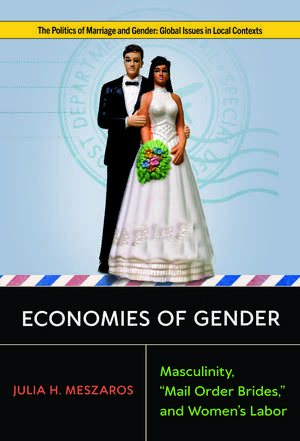Economies of Gender: Masculinity, "Mail Order Brides," and Women’s Labor: Politics of Marriage and Gender: Global Issues in Local Contexts
Autor Julia H. Meszarosen Limba Engleză Paperback – 14 oct 2025
Preț: 251.36 lei
Nou
Puncte Express: 377
Preț estimativ în valută:
48.11€ • 52.28$ • 40.44£
48.11€ • 52.28$ • 40.44£
Carte nepublicată încă
Doresc să fiu notificat când acest titlu va fi disponibil:
Se trimite...
Preluare comenzi: 021 569.72.76
Specificații
ISBN-13: 9781978842779
ISBN-10: 1978842775
Pagini: 176
Dimensiuni: 152 x 229 mm
Greutate: 0.45 kg
Editura: Rutgers University Press
Colecția Rutgers University Press
Seria Politics of Marriage and Gender: Global Issues in Local Contexts
ISBN-10: 1978842775
Pagini: 176
Dimensiuni: 152 x 229 mm
Greutate: 0.45 kg
Editura: Rutgers University Press
Colecția Rutgers University Press
Seria Politics of Marriage and Gender: Global Issues in Local Contexts
Notă biografică
JULIA H. MESZAROS is an associate professor of sociology at East Texas A&M University.
Descriere
Economies of Gender: Masculinity, "Mail Order Brides," and Women’s Labor explores the global dating industry, challenging stereotypes by examining how men seek "feminine capital" in international partners. Through twelve years of research, the book reveals how gender, labor, and cultural dynamics shape relationships across different regions.















